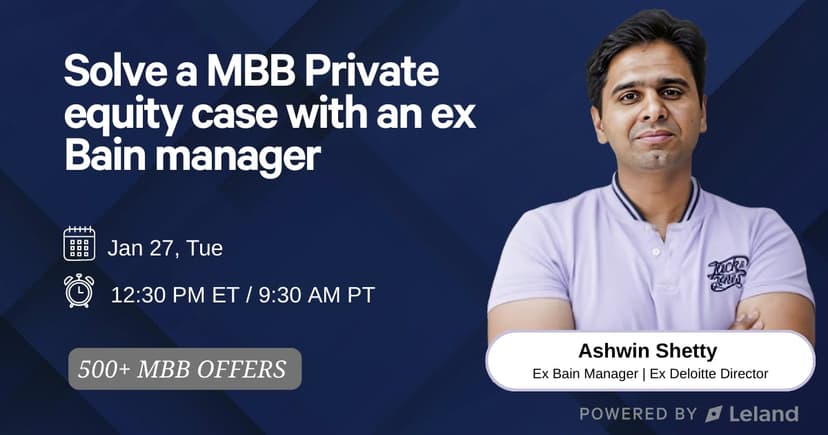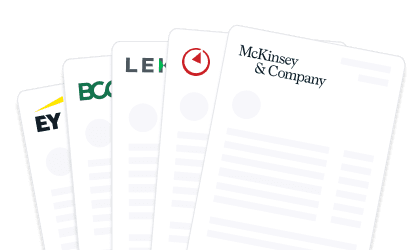Mastering Consulting Behavioral Questions: A Comprehensive Guide
If you're preparing for a consulting job interview, this comprehensive guide on mastering behavioral questions is a must-read.
Posted June 13, 2025

Join a free event
Learn from top coaches and industry experts in live, interactive sessions you can join for free.
Table of Contents
Consulting firms are known for their rigorous interview process, which often includes behavioral interviews. These interviews are designed to assess a candidate's suitability for the consulting role based on past experiences and behavior. Because they are such a crucial part of the interview process, it's essential to prepare for them thoroughly. In this comprehensive guide, we will cover everything you need to know to ace a consulting behavioral interview.
What are Consulting Behavioral Questions and Why are They Important?
Consulting behavioral questions aim to evaluate a candidate's behavior, actions, and skills in work-related situations. They are designed to assess a candidate's problem-solving abilities, communication skills, leadership, teamwork, and critical thinking. These questions are critical for consulting firms since they enable the interviewers to gauge the future performance of the candidates.
Moreover, consulting behavioral questions also help in identifying a candidate's cultural fit within the organization. Consulting firms have a unique work culture, and it is essential to hire candidates who can adapt and thrive in such an environment. These questions can reveal a candidate's values, work ethics, and personality traits, which are crucial in determining their compatibility with the company's culture.
Understanding the Types of Consulting Behavioral Questions
Consulting firms often ask several types of behavioral questions during the interview process. The most common types include questions on leadership, teamwork, communication, problem-solving, decision-making, and adaptability. Each question usually asks a candidate to describe a situation where they've used specific skills or encountered challenging circumstances, and how they've handled it.
Leadership questions are designed to assess a candidate's ability to lead a team and make decisions. These questions may ask about a time when the candidate had to take charge of a project or team, delegate tasks, and motivate team members to achieve a common goal.
Another common type of behavioral question is adaptability. These questions aim to evaluate a candidate's ability to adjust to new situations and handle unexpected challenges. Candidates may be asked to describe a time when they had to quickly adapt to a new environment or change their approach to a project due to unforeseen circumstances.
Tips for Preparing for Behavioral Interviews in Consulting
Preparing for behavioral interviews requires a lot of effort and preparation. A good starting point is to research the consulting firm and its values, culture, and clients. It is also crucial to practice answering behavioral questions with a trusted friend or mentor. Brush up on case studies and industry knowledge and prepare examples to demonstrate your competencies and skills. Additionally, make an effort to read up on the STAR method, which is an effective technique for structuring behavioral interview responses.
Another important aspect of preparing for behavioral interviews in consulting is to be aware of your body language and nonverbal cues. During the interview, make sure to maintain eye contact, sit up straight, and avoid fidgeting or slouching. Your body language can convey confidence and professionalism, which are important qualities in the consulting industry. Additionally, be sure to dress appropriately for the interview and arrive early to allow time for any unexpected delays. By paying attention to these details, you can present yourself as a polished and prepared candidate.
How to Answer Behavioral Questions in Consulting Interviews
The best way to answer behavioral questions in consulting interviews is to use the STAR method. This method involves outlining the situation, the task or challenge, the action you took, and the results you achieved. It's essential to avoid rambling, be concise, and focus on the most crucial details while answering the question. Make sure to use specific examples from your work experience rather than hypothetical scenarios.
Another crucial aspect of answering behavioral questions in consulting interviews is to demonstrate your problem-solving skills. Consulting firms are looking for candidates who can think critically and come up with innovative solutions to complex problems. Therefore, it's essential to showcase your ability to analyze a situation, identify the root cause of the problem, and develop a strategic plan to address it. Make sure to highlight your problem-solving skills by providing examples of how you have solved challenging problems in your previous work experience.
Common Consulting Behavioral Questions and How to Respond to Them
Consulting firms usually ask similar questions during behavioral interviews. Some of the most common questions include:
- Can you describe a situation where you had to solve a difficult problem?
- Tell me about a time where you had to work under pressure and deliver results.
- Can you describe a situation where you had to lead a team and deliver a successful outcome?
- What challenges did you face in a previous role, and how did you overcome them?
When answering these questions, it's best to provide as much detail as possible to demonstrate your abilities. Use the STAR method, focus on specific examples, and try to relate your past experiences to the consulting role.
It's also important to remember that consulting firms are looking for candidates who can think critically and creatively. Therefore, when answering behavioral questions, don't be afraid to showcase your problem-solving skills by providing unique and innovative solutions to the challenges you faced. Additionally, be sure to highlight any experience you have working with clients or stakeholders, as strong communication and interpersonal skills are essential in the consulting industry.
How to Use the STAR Method to Answer Behavioral Questions in Consulting
The STAR method is a structured approach to answering behavioral questions. This method involves outlining the situation, the task or challenge, the action you took, and the results you achieved. By using this technique, you can give a clear and concise answer that demonstrates your skills and abilities. Remember to focus on specific examples from your work experience, be concise, and avoid rambling.
One of the benefits of using the STAR method is that it helps you stay organized and focused during the interview. It can be easy to get sidetracked or go off on tangents when answering behavioral questions, but by following the STAR method, you can ensure that you are providing a structured and coherent response.
Another tip for using the STAR method is to practice beforehand. Think about some common behavioral questions that you might be asked in a consulting interview and come up with examples from your work experience that demonstrate your skills and abilities. By practicing your responses, you can feel more confident and prepared during the actual interview.
Key Skills and Competencies that Consulting Firms Look for in Behavioral Interviews
Consulting firms typically look for specific skills and competencies when conducting behavioral interviews. They include:
- Excellent problem-solving and analytical skills
- Strong communication and interpersonal skills
- Leadership and teamwork abilities
- Adaptability and flexibility
- Attention to detail and the ability to multitask efficiently
When preparing for a behavioral interview, keep these skills in mind, and make sure to have examples that demonstrate your proficiency in each of them.
In addition to the skills and competencies mentioned above, consulting firms also value candidates who possess a strong business acumen. This includes a deep understanding of financial statements, market trends, and industry-specific knowledge. Candidates who can demonstrate their ability to think strategically and make data-driven decisions are highly sought after in the consulting industry.
Another important skill that consulting firms look for is the ability to manage and prioritize multiple tasks and projects simultaneously. This requires strong organizational skills and the ability to work efficiently under pressure. Candidates who can demonstrate their ability to manage complex projects and meet tight deadlines are highly valued in the consulting industry.
Examples of Successful Responses to Consulting Behavioral Questions
Successful responses to consulting behavioral questions usually include a clear structure using the STAR method and showcase the candidate's problem-solving, analytical, and communication skills. An example of a great response to a teamwork question would be:
In my previous job, I was tasked with leading a team to deliver a project for a high-profile client. We faced several challenges, including tight deadlines and changing requirements. To overcome these challenges, I worked closely with my team to establish clear goals and expectations and created a detailed project plan. Throughout the project, I made sure to communicate regularly with my team to ensure that everyone stayed on track. Our hard work paid off, and we delivered the project on time, which led to increased revenue for the firm.
Another example of a successful response to a consulting behavioral question could be when a candidate is asked about their ability to handle difficult clients. A great response would be:
In my previous job, I had a client who was very demanding and often changed their requirements at the last minute. To handle this situation, I made sure to listen carefully to their needs and concerns and provided regular updates on our progress. I also worked with my team to come up with creative solutions to meet the client's changing requirements. By being proactive and responsive, we were able to build a strong relationship with the client and deliver a successful project.
Another important aspect of consulting is the ability to work under pressure. When asked about this, a successful response could be:
In my previous job, I often had to work on multiple projects with tight deadlines. To manage my workload, I prioritized tasks based on their importance and urgency and created a detailed schedule to ensure that I met all the deadlines. I also made sure to communicate regularly with my team and clients to manage expectations and avoid any surprises. By being organized and proactive, I was able to deliver high-quality work under pressure.
How to Stand Out in Your Consulting Interview Using Behavioral Interview Techniques
The best way to stand out in a consulting interview is to use behavioral interview techniques effectively. This involves showing confidence, being articulate, and using the STAR method to structure your answers. It's also essential to demonstrate your industry knowledge and research the consulting firm. Lastly, make sure to ask thoughtful questions at the end of the interview to show your enthusiasm and interest in the role.
Mistakes to Avoid When Answering Behavioral Questions in a Consulting Interview
When answering behavioral questions in a consulting interview, several mistakes can undermine your chances of success. Some of the most common mistakes include:
- Rambling and not being concise
- Not providing specific examples
- Avoiding difficult questions
- Overconfidence and arrogance
By avoiding these mistakes and practicing effective communication and presentation skills, you can ace the consulting behavioral interview.
How to Follow Up After a Consulting Interview with Behavioral Questions
After a consulting interview with behavioral questions, it's always a good idea to follow up with a thank-you email. In the email, thank the interviewers for their time and reiterate your interest in the role. You can also add any additional information that you forgot to mention in the interview. A follow-up email shows professionalism, gratitude, and interest in the position, which can set you apart from other candidates.
In conclusion, mastering consulting behavioral questions is essential for succeeding in the rigorous consulting interview process. By preparing thoroughly, using effective communication techniques and the STAR method, demonstrating industry knowledge, and avoiding common mistakes, you can demonstrate your abilities and stand out as the best candidate for the role.
Browse hundreds of expert coaches
Leland coaches have helped thousands of people achieve their goals. A dedicated mentor can make all the difference.


























